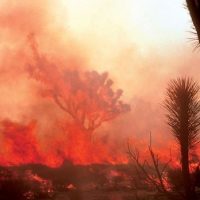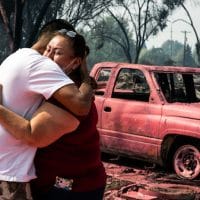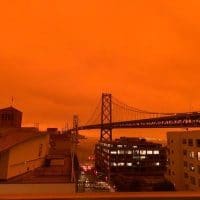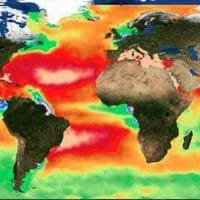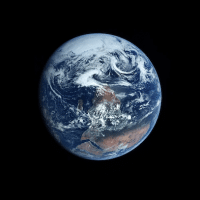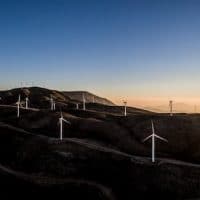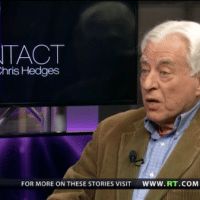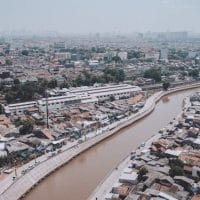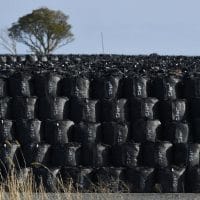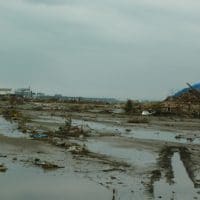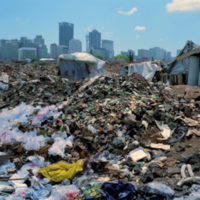-
The Dying Planet Report 2020
The report, released September 10th, describes how the over-exploitation of ecological resources by humanity from 1970 to 2016 has contributed to a 68% plunge in wild vertebrate populations, inclusive of mammals, birds, amphibians, reptiles and fish.
-
All eyes on Wet’suwet’en
Suzanne Dhaliwal, in collaboration with Indigenous Climate Action, explains how the struggle to end Canada’s colonial violence is continuing in the face of fossil fuel extractivism.
-
California’s apocalyptic ‘second nature’
A new, profoundly sinister nature is rapidly emerging from our fire rubble at the expense of landscapes we once considered sacred. Our imaginations can barely encompass the speed or scale of the catastrophe. Gone California, gone.
-
Oregon can’t fight wildfires because its helicopters were sent to Afghanistan
Many of Oregon’s largest firefighting aircraft are not available because the Department of Defense has sent them to Afghanistan to fight in the 20-year-old war.
-
Gov’t silent as climate change unfolds
From megafires, extreme heat waves, summer snow storms and hurricanes, millions across the United States are witnessing the effects of climate change first hand.
-
Nobel prize-winning economics of climate change is misleading and dangerous – here’s why
While climate scientists warn that climate change could be catastrophic, economists such as 2018 Nobel prize winner William Nordhaus assert that it will be nowhere near as damaging.
-
Triple crisis in the Anthropocene Ocean
Scientists call them a ‘deadly trio.’ If acidification, oxygen loss, and overheating are not ended soon, a massive die-off of ocean life may be unstoppable.
-
Ecosocialism: the elephant in the DSA room?
Allan Todd reviews Bigger than Bernie How We Go from the Sanders Campaign to Democratic Socialism by Meagan Day and Micah Uetricht, Verso
-
‘What stage of capitalism is this?’ Hedge fund $3 billion richer thanks to wager on wildfire insurance claims
With over 100,000 people displaced by wildfires raging across California, Baupost Group collected more than $3 billion in July after betting on insurance claims against embattled utility company PG&E.
-
Oil spill threatens disaster for Mauritius
The Japanese-owned (Mitsui-operated) MV Wakashio was en route to Brazil from China to fetch iron ore from a port owned by the notorious mining company Vale. Here the ship is seen having run aground near Blue Bay, one of the area’s most pristine sites for coral, already threatened by bleaching due to the climate crisis. Now the marine life and fisherfolk must survive this spill.
-
Dead Zones: Industrial agriculture versus ocean life
Worldwide, there are now over a thousand coastal areas where fish can’t breathe. The nitrogen that makes crops grow is also destroying offshore ecosystems.
-
Lebanon explosion is an ecosocialist issue
In saying that the terrible explosion in Beirut is an ecosocialist issue I am not counterposing this claim to the fact that this is also an issue of corruption, of government incompetence, of health and safety and many other things.
-
The parlous state of poverty eradication
The world is at an existential crossroads involving a pandemic, a deep economic recession, devastating climate change, extreme inequality, and an uprising against racist policies. Running through all of these challenges is the longstanding neglect of extreme poverty by many governments, economists, and human rights advocates.
-
‘Either you are fighting to eliminate exploitation or not’: A leftist critique of the Green New Deal
Canadian Dimension in conversation with essayist, researcher and historian Max Ajl
-
On Contact: Ecosocialism with Victor Wallis
On the show this week, Chris Hedges talks to writer, teacher and activist Victor Wallis about the prospect and need for ecosocialism. Wallis’ book is entitled ‘Red-Green Revolution: The Politics and Technology of Ecosocialism’.
-
Green structural adjustment in the World Bank’s resilient cities
Cities across the world are facing a double-barreled existential problem: how to adapt to climate change and how to pay for it.
-
Tokyo Olympics and Fukushima “Revival”
At the 1964 Tokyo Olympics a young man born on the day of Hiroshima nuclear bombing was selected to be the last torch bearer on the relay, to signify that Japan had stood up from nuclear ruin. In an attempt to replicate the 1964 Olympic theme, the Abe government has constructed the idea of a Fukushima “revival,” a returned to normal. Exposing this illusion is an important cultural war.
-
Revolution or ruin
We know how the first paragraph begins. We’ve read about the changing climate for over twenty years, infrequently at first and then daily until we couldn’t deny it any longer. The world is burning.
-
Vale Jack Mundey: Inspirational Australian Union Leader
Jack Mundey, the leader of the NSW Builders Labourers’ Federation between 1968 and 1974 has passed away at the age of 90. An initiator of the “green bans”, Jack was a Marxist who rediscovered the ecological essence of Marxism.
-
Capitalism and Nature – A really inconvenient truth
The balance of nature is not the same today as in Pleistocene times, but it is still there: a complex, precise, and highly integrated system of relationships between living things which cannot safely be ignored any more than the law of gravity can be defied with impunity by a [person] perched on the edge of a cliff. The balance of nature is not a status quo; it is fluid, ever shifting, in a constant state of adjustment. [Humans], too, [are] part of this balance.



